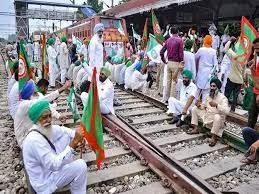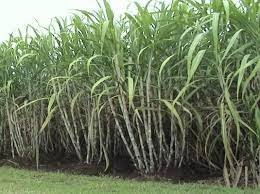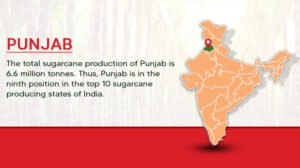The ongoing farmers’ strike to increase the sugarcane rates in Punjab has been ended after talks with CM Bhagwant Mann. Farmers have moved away from highways and railway tracks.
According to the information, some farmers did not agree on the conversation with the CM. However, later it was decided to end the strike.
According to media reports, employees of nine sugar mills across the state started an indefinite strike from November 24 demanding fulfillment of their demands. Under the leadership of Fazilka Central Cooperative Sugar Mill President Het Ram, a large number of employees staged a protest in the mill premises on Friday.
CM Bhagwanth Mann intervenes with sugarcane farmers
The positive news about the rate and compensation for the losses they suffered from the floods earlier this year will reach sugarcane growers in the next few days. I’m not going to announce it today. The announcement by the government is approaching,” Mann stated following the meeting.

We had a friendly conversation that was quite in-depth. With a SAP of Rs 380 per quintal, Punjab had the highest. Just a few days ago, Haryana raised it to Rs 386 per quintal. We will also speak with the millers. We must speak with them as well before making any announcements,” the CM stated.
16 sugar mills are located in Punjab; nine of them are owned by the government and seven are not, according to Mann. “We have already paid off a total of Rs 709 crore in government-owned mill debt. The government of Punjab is currently debt-free from the sugar mills. Just two private sugar mills are in debt: one in Phagwara, which owes Rs 14.86 crore, and another in Dhuri, which owes Rs 46 lakh.
According to Manjit Rai, the leader of BKU (Doaba), the “chief minister has assured the best rate of sugarcane in the country” to media. Mann added that all mills will be operational by November 30. Rai repeated this point, adding that prices would be announced during the next Vidhan Sabha meeting.
The Demands of the sugarcane mill employees
The demands of the employees include implementation of the Sixth Pay Commission recommendations, regularization of contractual employees and provision of permanent job to the family member of an employee who dies during service.
Speaking to The Tribune, Hardeep Singh Muggowal, president of the Punjab Raj Cooperative Block Mills Workers Federation, alleged that, despite repeated meetings with the authorities concerned, the government has failed to heed their demands.
He said that, the employees had protested in front of the office of Sugarfed Punjab in Chandigarh on October 31. As a result, the government had invited representatives of the federation to meet the state finance minister on 20 November.
Muggowal said that the minister has assured them that their demands will be met before the start of the crushing season. However, despite this, Muggowal alleged that the government has not taken any concrete measures. He said that the employees have now decided to stop work until their demands are accepted. Muggowal said that if their demands were not met, the protesters would not allow the crushing session to begin.
The Protests
The protest is likely to adversely impact sugarcane farmers as they will not be able to bring their produce to the mills without the slips issued by the clerical staff, who have also joined the protest.
Thousands of farmers came together and pitched tents. There has been no longer any vehicle traffic between Jalandhar and Ludhiana or Jalandhar and Nawanshahr in the vicinity of the stretch.

On Tuesday, members of the Samyukt Kisan Morcha had launched an indefinite dharna on the Jalandhar-Phagwara stretch of the National Highway near Dhanowali village, demanding an increase in the Sugarcane Assured Price from Rs 380 to Rs 450 per quintal.
In order to catch the buses, hundreds of commuters who were traveling on either side of the dharna had to walk more than 4 km. The only portions of the roadway that could be used for transportation were the service lanes.
Manjit Rai, the protest’s leader from the Bhartiya Kisan Union (Doaba), claimed that despite their repeated requests, the SAP has not been improved.
“On the promise of the administration, we canceled the dharna that was scheduled for November 8 and postponed it. We have been informed that the Cane Commissioner has summoned a meeting for this Wednesday, but we have not received an invitation. We’ve been informed that a notice of a price increase will be issued following the meeting, but our dharna is unending and won’t end until we obtain the amount we demand.”
According to him, the BKUs from Rajewal and Ugrahan had also joined the demonstration. Rai announced that the farmer unions would meet on Tuesday at 3 p.m. to discuss whether to disrupt rail traffic as well.
The Sugarcane Crop Farming in Punjab

Saccharum officinarum L., or Sugarcane, is a perennial grain. It is native to India and a member of the bamboo family. It is the primary supplier of khandsari, jaggery, and sugar. Just one-third of the sugarcane grown in India ends up in sugar factories; the other two-thirds is used to make khandsari and jaggery. It also supplies the raw materials needed to make alcohol.

In Punjab, to have about 896 lakh quintals of sugarcane available for crushing, about 1.80 lakh hectares of land must be planted with sugarcane. In the year 2014–15, there were 94,000 hectares under sugarcane cultivation. Of those, 705 lakh quintals were produced, of which 569 lakh were crushed and 53.6 lakh were sugar produced.
In the economic year 2021, Punjab, India, produced roughly 83 thousand kg of sugarcane per hectare. In that particular year, India produced about 83 thousand kg of sugarcane per hectare. In the nation, sugarcane is a significant cash or profit crop.












Comments 1